|
|
|
Sort Order |
|
|
|
Items / Page
|
|
|
|
|
|
|
| Srl | Item |
| 1 |
ID:
134144
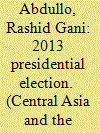

|
|
|
|
|
| Publication |
2014.
|
| Summary/Abstract |
The author looks at the problem of the legitimacy of the 2013 presidential election in Tajikistan as a sine qua non of social and political stability and, consequently, of the country's security and territorial integrity. In Tajikistan's specific case, the election could only be legitimate if the opposition forces, primarily the Islamic Revival Party of Tajikistan (IRP), which comes second after the institution of presidential power as the most influential political force, did not boycott it.
Despite the easily predicted results (another term for President Rakhmon), the IRP leaders decided to take part in the process: an Islamic revival could only take place in a politically stable Tajikistan. To gain public legitimacy for their decision, they organized a series of consultations with representatives of the public to formulate and realize the idea of an Alliance of the Reformist Forces of Tajikistan (ORST), which nominated human rights activist Oinihol Bobonazarova as its joint presidential candidate. She did not run because, after failing to present the necessary number of signatures gathered in her support to the Central Election Commission, she was not registered as a candidate. The IRP leaders abstained from voting, but denied all accusations of boycotting the election.
President Rakhmon, who won the election, and the IRP, which stuck resolutely to its course and was able to keep the Islamic revival going, were both winners. The country benefited the most-the election did not shake the frail stability, while Tajikistan's enemies lost another chance to interfere in its domestic affairs with destructive intentions.
|
|
|
|
|
|
|
|
|
|
|
|
|
|
|
|
| 2 |
ID:
082032
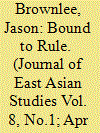

|
|
|
|
|
| Publication |
2008.
|
| Summary/Abstract |
This article revisits the electoral emphasis of hybrid regime studies, arguing instead that the impact of elections is structured by variations in prior political institutions, particularly the dismantlement or maintenance of a ruling party. Duration tests on 136 regimes indicate that ruling parties reduce the chance of regime collapse, while "electoral autocracy" has no significant effect. A paired comparison of Malaysia and the Philippines then shows how variations in party institutions propelled divergent courses of authoritarian dominance and democratization. During the late 1980s and 1990s, Malaysia's ruling party (UMNO) bound together otherwise fractious leaders, twice deflecting potent electoral challenges. By contrast, when Ferdinand Marcos abandoned the Nacionalista Party after 1972, he fueled the movement that would subsequently oust him. The efficacy of opposition parties Semangat '46 and United Nationalist Democratic Opposition (UNIDO) was thus heavily imbricated with the institutions of the regimes they challenged and less contingent on short-term electoral politics.
|
|
|
|
|
|
|
|
|
|
|
|
|
|
|
|
| 3 |
ID:
093215
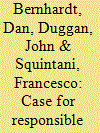

|
|
|
| 4 |
ID:
160205
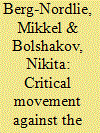

|
|
|
|
|
| Summary/Abstract |
In 2010, Russian authorities presented a new draft law on education, which immediately became controversial. The essay examines whether user groups (parents) and low-ranking sector employees (teachers) were active in the movement critical of the reform, and how the state responded to the anti-reform movement. The movement consisted of several networks and organisations with no central node. It included teachers, parents and activists from both non-systemic groups and systemic opposition parties. Pressure from below by networks and organisations was combined with pressure from actors situated above in the political system, that is, in the Duma. Since the movement was welfare-oriented rather than fundamentally regime-critical, the Russian authorities tolerated open criticism both from civil society and inside the Duma. Some gains for teachers were won, but the movement’s proposed amendments and demands were generally rejected or only introduced in revised form.
|
|
|
|
|
|
|
|
|
|
|
|
|
|
|
|
| 5 |
ID:
143662
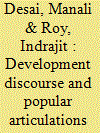

|
|
|
|
|
| Summary/Abstract |
This article discusses how members of marginalized groups in the Indian state of Gujarat make sense of hegemonic discourses about national development in light of their own experiences and material circumstances. For many, the idea of development resonates even when they do not experience material progress in their lives. This partial hegemony of development discourse can be explained by the concept of “political articulation.”. This captures the political process by which parties succeed, at specific historical moments and under certain circumstances, in joining different, even potentially conflictual interests by referring to a common idea and project. The article focuses on Ahmedabad city where the Bharatiya Janata Party (BJP) has created a cross-caste bloc through the trope of development. The BJP has been particularly effective in linking the idea of development to mundane concerns about security, identity and spatial order. However, anxieties about the degradation of labour by increased casualization, informalization, and socio-spatial marginalization have disrupted this common sense linkage and weakened the hegemony of the BJP's model of development.
|
|
|
|
|
|
|
|
|
|
|
|
|
|
|
|
| 6 |
ID:
121089
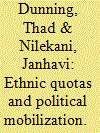

|
|
|
|
|
| Publication |
2013.
|
| Summary/Abstract |
Ethnic quotas are often expected to induce distribution of material benefits to members of disadvantaged groups. Yet, the presence of an ethnic quota does not imply that political mobilization takes place along ethnic lines: Cross-cutting affiliations within multi-ethnic party organizations may lessen the tendency of politicians to target benefits to particular ethnic groups. In this article, we evaluate the impact of quotas for the presidencies of village councils in India, a subject of considerable recent research. Drawing on fine-grained information from surveys of voters, council members, presidents, and bureaucrats and using a natural experiment to isolate the effects of quotas in the states of Karnataka, Rajasthan, and Bihar, we find weak distributive effects of quotas for marginalized castes and tribes, but suggestive evidence of the importance of partisanship. We then use survey experiments to compare the influence of party and caste on voting preferences and expectations of benefit receipt. Our results suggest that especially when politicians have dynamic political incentives to allocate benefits along party lines, cross-cutting partisan ties can blunt the distributive impact of ethnic quotas.
|
|
|
|
|
|
|
|
|
|
|
|
|
|
|
|
| 7 |
ID:
121833
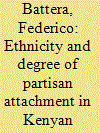

|
|
|
|
|
| Publication |
2013.
|
| Summary/Abstract |
The present analysis disaggregates election results and voter turnout according to the voters' ethnic background during a time span which covers three electoral processes (1997-2007) in Kenya. The two data combined produced an index which was called the 'degree of mobilization index'. Given that most of the Kenyan parties proved to be ethnic or made of ethnic alliances, voter turnout was found crucial in differentiating the degree of ethnic mobilization. Ethnicity alone, however, failed to explain these differences. The findings were likely linked to the past record of patronage for the five selected ethnic groups and the ability of such groups to provide a cohesive ethnic leadership.
|
|
|
|
|
|
|
|
|
|
|
|
|
|
|
|
| 8 |
ID:
139287
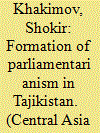

|
|
|
|
|
| Summary/Abstract |
This article examines the comparative legal, theoretical, and historical aspects of parliamentarianism. The author analyzes the formation of Tajik parliamentarianism and describes its primary characteristics. He also gives the reasons for the formation of parliamentarianism in Tajikistan and the obstacles hindering it.
|
|
|
|
|
|
|
|
|
|
|
|
|
|
|
|
| 9 |
ID:
180062


|
|
|
|
|
| Summary/Abstract |
In the first elections for the Israeli parliament (January 1949) WIZO ran as a women's party seeking equal rights for women. It won enough votes for a parliamentary seat – highly unusual in that day and age. WIZO was unique in that it started out as an apolitical women's organisation aligned with the mid-stream Zionist consensus and redefined itself as a party fighting for gender equality.This article examines the developments in the General Zionist Party that led WIZO, founded as a women's philanthropic organisation, to run as an independent political party on its own platform on the eve of the establishment of the State of Israel. It will also look at the impact of WIZO party on Israel's center-right - the General Zionists, the Progressive party and Herut - in the context of the Constituent Assembly elections. The establishment of a women's party in 1948-49 was a unique phenomenon with no equal anywhere in the world at the time.
|
|
|
|
|
|
|
|
|
|
|
|
|
|
|
|
| 10 |
ID:
161445


|
|
|
|
|
| Summary/Abstract |
The results of Malaysia’s 14th General Elections held in May this year were unexpected and transformative. Against conventional wisdom, the newly-reconfigured opposition grouping Pakatan Harapan decisively defeated the incumbent Barisan Nasional. Despite a long-running financial scandal dogging the incumbents, an opposition victory had been all but discarded due to the advantages of incumbency, a deep fissure amongst opposition ranks, and a favourable economic outlook. Notwithstanding this, deeply-rooted political dynamics and influential actors came together, reconfiguring the country’s political landscape in the process. In order to understand the elections and their implications, this article sets out the country’s institutional context and then identifies key drivers and agents of change. From there, it assesses the conduct of the elections, analyses their results, and explores implications for the future.
|
|
|
|
|
|
|
|
|
|
|
|
|
|
|
|
| 11 |
ID:
170181


|
|
|
|
|
| Summary/Abstract |
Can theories explaining far right voting in Western Europe be extended to post-communist Eastern Europe? We address this question with a comparative demand-side analysis of far right parties and their voters in four post-communist countries: Bulgaria, Latvia, Lithuania, and Slovakia. Our findings indicate the emergence of two distinct types of far right party. While the Latvian and Lithuanian far right resemble the new radical right (NRR) model, the Bulgarian far right comes closer to the welfare chauvinist ideal type. The far right mobilised anti-Semitic voters in Latvia, Slovakia and Bulgaria. In all four cases, the far right was especially successful in capturing the votes of ethnic majority members who are the most opposed to their country’s formerly dominant ethnic group.
|
|
|
|
|
|
|
|
|
|
|
|
|
|
|
|
| 12 |
ID:
091093


|
|
|
|
|
| Publication |
2009.
|
| Summary/Abstract |
After a decade of democracy, secular political parties dominate Muslim-majority Indonesia. Explanations include a historical pattern of religious pluralism, policies of President Suharto's New Order, creative Muslim responses to those policies, a large majority of moderate Muslim voters, and ineffective voter mobilization by Islamist parties today.
|
|
|
|
|
|
|
|
|
|
|
|
|
|
|
|
| 13 |
ID:
160431
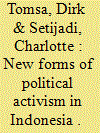

|
|
|
|
|
| Summary/Abstract |
This article argues that new personality-centric movements have redefined the nexus between activism and electoral politics in Indonesia. It illustrates how these movements have challenged the role of political parties and consultants in electoral campaigning, and how their growing prominence may affect the future trajectory of Indonesian politics.
|
|
|
|
|
|
|
|
|
|
|
|
|
|
|
|
| 14 |
ID:
110558
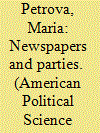

|
|
|
|
|
| Publication |
2011.
|
| Summary/Abstract |
Media freedom strongly inhibits corruption and promotes good governance, but what leads to media freedom? Do economic development and higher advertising revenues tend to make media outlets independent of political groups' influence? Using data on nineteenth-century American newspapers, I show that places with higher advertising revenues were likelier to have newspapers that were independent of political parties. Similar results hold when local advertising rates are instrumented by regulations on outdoor advertising and newspaper distribution. In addition, newly created newspapers were more likely to enter the market as independents in places with higher advertising rates. I also exploit the precise timing of major changes in advertising rates to identify how advertising revenues affected the entry of new newspapers. Finally, I demonstrate that economic development, and concomitant higher advertising revenue, is not the only reason that an independent press expands; political factors also played a role.
|
|
|
|
|
|
|
|
|
|
|
|
|
|
|
|
| 15 |
ID:
117495


|
|
|
|
|
| Publication |
2012.
|
| Summary/Abstract |
Barack Obama's election as US president gave rise to hopes of radical reform. Indeed, comparisons were drawn with 1932 and there were references to 'realignment'. Many on the left were quickly disappointed by the limited character of the American Recovery and Reinvestment Act, the abandonment of proposed reforms, and the concessions that were made to ensure the passage of healthcare legislation. Some explained these failures through agency-based accounts and pointed to what they saw as personal weakness. Others stressed the structural constraints imposed by the asymmetric character of partisan polarisation, the political weight of capital, and the institutional character of the American state. The article argues that the character of the 'Obama coalition' should also be considered. It has been relatively narrow particularly when compared with the 'Roosevelt coalition'. In particular, it failed to draw business fractions into its ranks.
|
|
|
|
|
|
|
|
|
|
|
|
|
|
|
|
| 16 |
ID:
145091
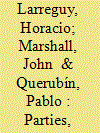

|
|
|
|
|
| Summary/Abstract |
Despite its prevalence, little is known about when parties buy turnout. We emphasize the problem of parties monitoring local brokers with incentives to shirk. Our model suggests that parties extract greater turnout buying effort from their brokers where they can better monitor broker performance and where favorable voters would not otherwise turn out. Exploiting exogenous variation in the number of polling stations—and thus electoral information about broker performance—in Mexican electoral precincts, we find that greater monitoring capacity increases turnout and votes for the National Action Party (PAN) and the Institutional Revolutionary Party (PRI). Consistent with our theoretical predictions, the effect of monitoring capacity on PRI votes varies nonlinearly with the distance of voters to the polling station: it first increases because rural voters—facing larger costs of voting—generally favor the PRI, before declining as the cost of incentivizing brokers increases. This nonlinearity is not present for the PAN, who stand to gain less from mobilizing rural voters.
|
|
|
|
|
|
|
|
|
|
|
|
|
|
|
|
| 17 |
ID:
110534
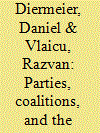

|
|
|
|
|
| Publication |
2011.
|
| Summary/Abstract |
We present a theory of parties-in-legislatures that can generate partisan policy outcomes despite the absence of any party-imposed voting discipline. Legislators choose all procedures and policies through majority-rule bargaining and cannot commit to vote against their preferences on either. Yet, off-median policy bias occurs in equilibrium because a majority of legislators with correlated preferences has policy-driven incentives to adopt partisan agenda-setting rules-as a consequence, bills reach the floor disproportionately from one side of the ideological spectrum. The model recovers, as special cases, the claims of both partisan and nonpartisan theories in the ongoing debate over the nature of party influence in the U.S. Congress. We show that (1) party influence increases in polarization, and (2) the legislative median controls policy making only when there are no bargaining frictions and no polarization. We discuss the implications of our findings for the theoretical and empirical study of legislatures.
|
|
|
|
|
|
|
|
|
|
|
|
|
|
|
|
| 18 |
ID:
105176
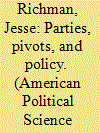

|
|
|
|
|
| Publication |
2011.
|
| Summary/Abstract |
Identifying policy status quo locations is a precondition for testing key predictions of many spatial models of legislative politics, but such measures have proved to be extremely difficult to construct. This study applies a novel technique that measures policy locations in relation to legislators' preferences. The resulting status quo estimates allow for a direct test of the policy consequences predicted by pivotal politics and party cartel theories of legislative politics. The empirical tests indicate that parties interact with pivotal politics to contribute to policy gridlock and shape policy change. By bringing pressure to bear on pivotal politics "pivots" and by blocking policy changes that would "roll" the party, parties increase the range of policies subject to gridlock in the American political system.
|
|
|
|
|
|
|
|
|
|
|
|
|
|
|
|
| 19 |
ID:
093879


|
|
|
|
|
| Publication |
2010.
|
| Summary/Abstract |
The death of President Levy Mwanawasa in August 2008 plunged Zambian politics into a state of flux. This article argues that the way the main parties responded to the challenge of the resulting presidential by-election has three lessons to teach the emerging literature on political parties. First, Rupiah Banda's rise to power within the MMD demonstrates the extent to which intra-party machinations can leave a party saddled with an unpopular leader, and hence illustrates the great significance of succession struggles within dominant-party systems. Second, the main parties' continual repositioning of their electoral platforms reveals that not all African elections take place in an ideological vacuum, and shows that the platforms parties adopt can only be fully understood in the context of the wider party system and the way in which parties interact over time. Finally, the ability of controversial opposition leader Michael Sata to mobilize a diverse support base - by employing a 'populist' message in urban areas at the same time as receiving the support of his ethno-regional community in rural areas - lays bare the complexity of party strategies and the limits of the 'ethnic census' model of party support. Taken together, these findings suggest that the tendency to divorce the study of elections from the study of how parties function and interact impoverishes our understanding of African politics
|
|
|
|
|
|
|
|
|
|
|
|
|
|
|
|
| 20 |
ID:
096264


|
|
|
|
|
| Publication |
2010.
|
| Summary/Abstract |
The Scottish National Party (SNP) won control of Scotland's devolved government in the 2007 election yet opinion polls show no majority for its objective of independence in Europe. While the party is adept at exploiting short-term political opportunity structures in the wider British context, as well as appealing to the 'opinion electorate', it appears less successful at persuading a majority of Scottish voters to agree with its core ideology. Helpful parallels can be drawn between 2007 and the last time the party polled over 30 per cent of the popular vote in Scotland at the 1974 (October) British General Election-then, as now, the Scottish voter appears to be willing to distinguish between party and policy.
|
|
|
|
|
|
|
|
|
|
|
|
|
|
|
|
|
|
|
|
|